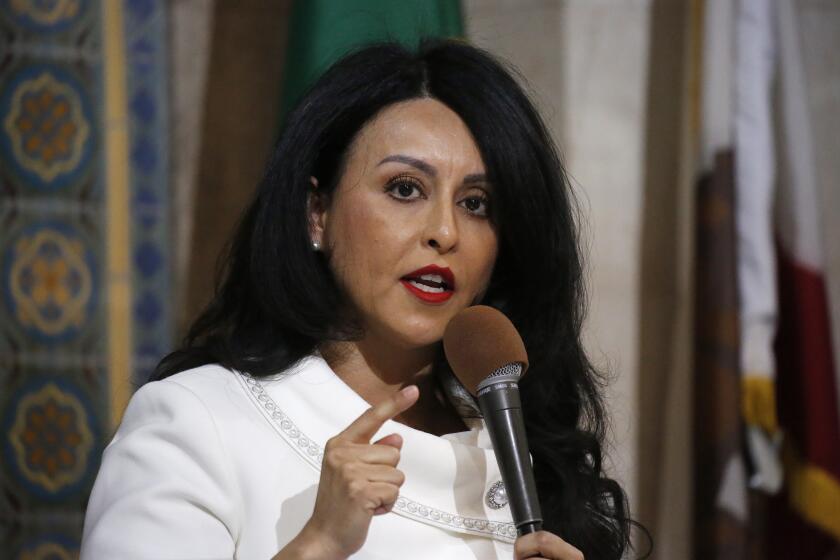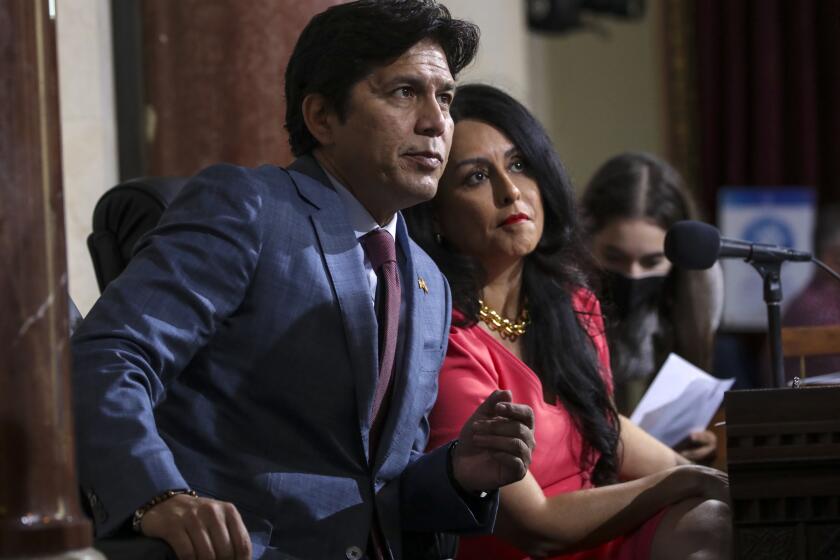For Black Angelenos, recording stokes anger, fears of losing hard-fought gains
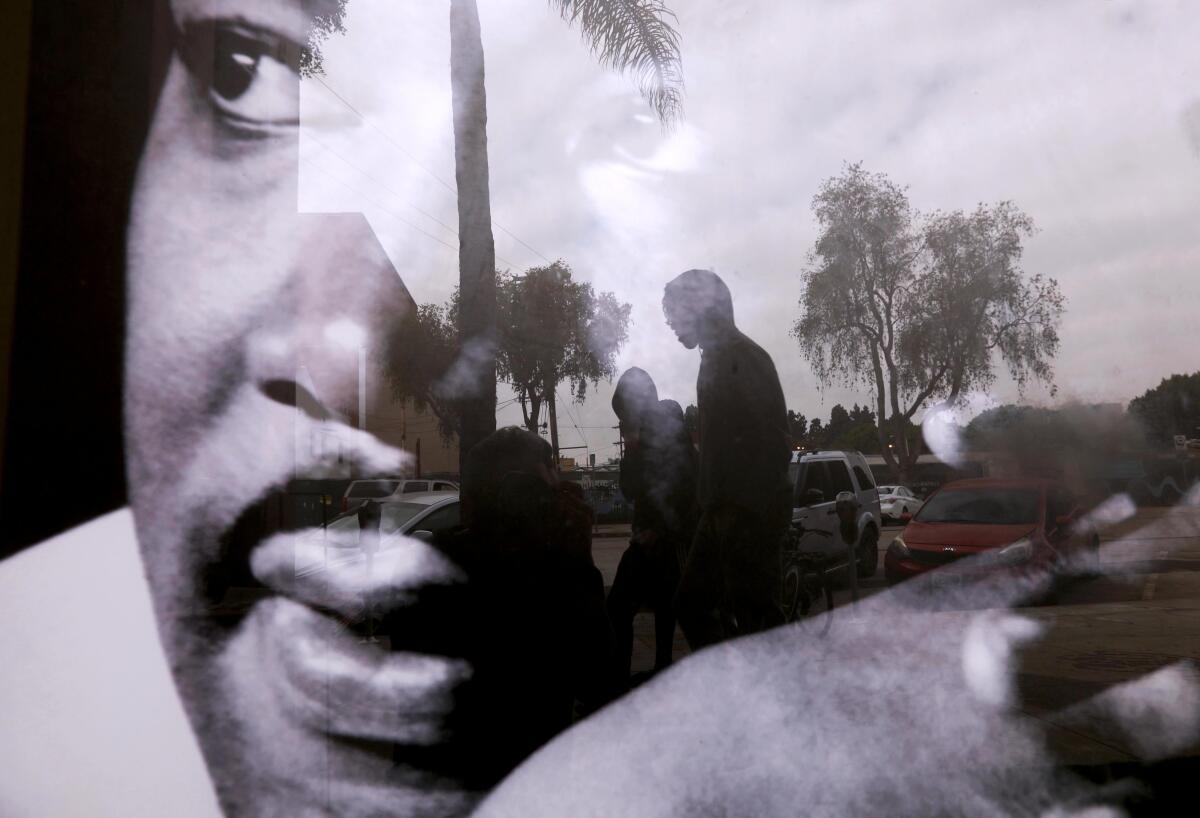
- Share via
Watching the news in her View Park home, Helen Ray sat in stunned disbelief as she listened to the now infamous tape of three Los Angeles City Council members and a labor leader privately strategizing about redistricting.
It wasn’t the casual racist rhetoric that upset her most. It was the topic: They sounded as if they were plotting a backroom deal to disenfranchise Black voters.
“This feels like a betrayal almost akin to Jan. 6,” said Ray, 76. “Donald Trump tried to overturn the election results and discount Black votes so he could be reelected president. Now, I feel the same kind of betrayal coming from City Council members.
“It’s hurtful to know that these people don’t care about the whole L.A.,” she said.
To Black residents across the city, the words on the year-old tape hit like a gut punch when the news broke Sunday. Around dinner tables, in coffee shops, beauty salons, bookstores and group chats, they decried the derogatory language on the leaked audio recording and vented about what sounded to them like scheming to weaken the limited political power they fought for generations to acquire.
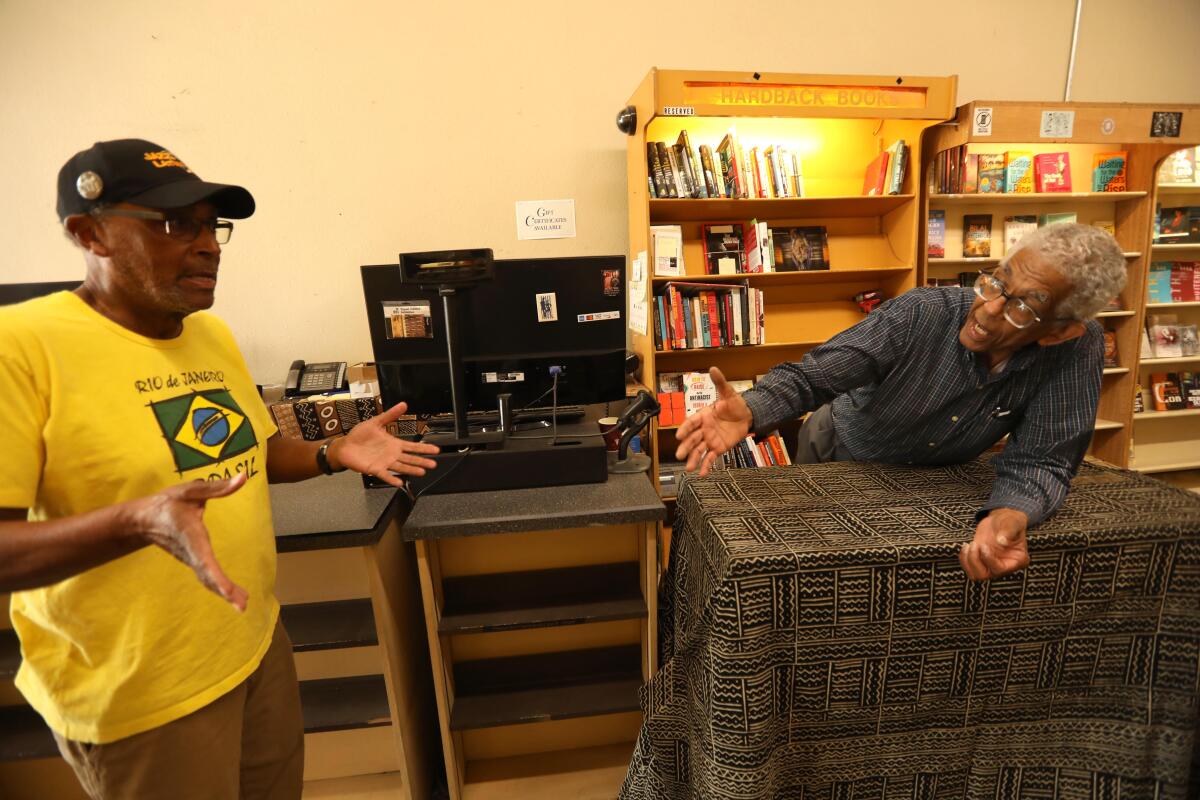
On a quiet Tuesday afternoon at Eso Won Books, a beloved Leimert Park bookstore that has served as a conduit for the Black community to have conversations about race and other social issues for more than three decades, co-owner James Fugate was talking about the recording with a longtime customer.
“The real question is, are there people in the wings with the moral fiber necessary to move forward?” said Clint Rosemond of Inglewood, as he stood at the checkout counter inside the bare bookstore, which is set to close by the end of December. “Cause these [three] are bottom feeders.”
During an October 2021 conversation with L.A. Councilmembers Gil Cedillo and Kevin de León and L.A.
“These people are corrupt,” Fugate responded.
“I think all three of them are going to have to go,” he added.
“It’s just a matter of time,” 82-year-old Rosemond said, shaking his head. (City Council President Nury Martinez, who was caught on tape using the most derogatory language of the group, resigned Wednesday.)
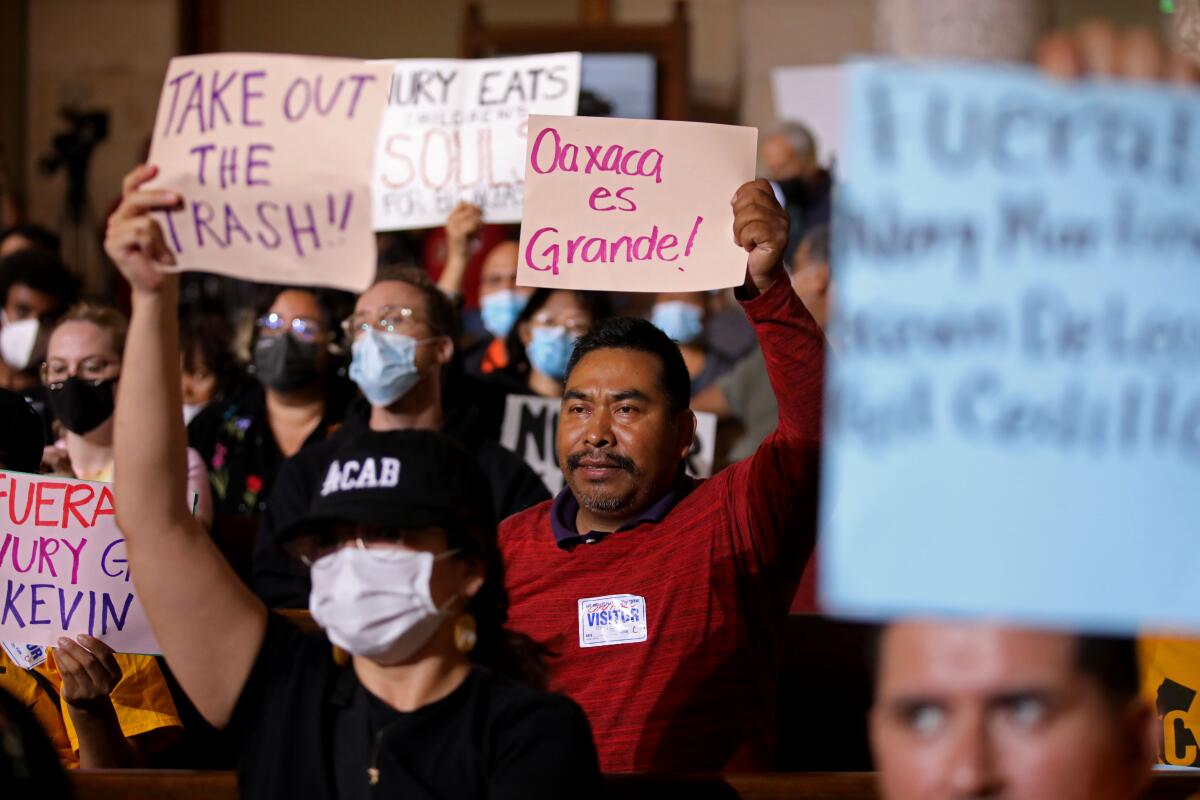
“It’s one of the biggest political [scandals] I’ve heard in years, but to me it’s like, ‘OK,’” Fugate told a Times reporter. “This is what needs to come out because people need to know.”
For some Angelenos, the politicians’ remarks were hurtful to hear, but they took it as the mindset of four people and not a population. Other residents said the leaked audio exposed fissures that many thought were healed decades ago as L.A.’s Black and Latino residents and elected officials united to fight problems plaguing both of their communities.
Latinos make up half of the city’s population but — since Martinez’s resignation — occupy only three of the city’s 15 council seats. At the same time, the Black population has declined over the decades to 9% as more people have moved to the suburbs and out of the state for cheaper housing, better schools and job opportunities. Still, three historically Black districts that now have significant Latino populations have elected Black councilmembers to the dais.
So much for solidarity. Leaked audio of L.A.’s Latino leaders plotting to dilute Black political power is sure to lead to new fears and new divisions.
Kerman Maddox, a veteran political consultant in the city, was getting ready for church early Sunday morning when he received a link to an audio recording. The voices rising from his phone sounded distinct and familiar — Martinez, county labor leader Ron Herrera, and Councilmembers Kevin de León and Gil Cedillo, one of his good friends.
“It was like a stab in the back,” Maddox said.
Over three decades, the two had joined forces to bring their communities together. This civic call to service brought Maddox and Cedillo shoulder to shoulder at church services, labor events and on the campaign trail.
But now there was his friend, on tape, participating in a conversation in which Martinez talked about her white colleague’s Black son, saying “parece changuito,” or “looks like a monkey.” As she said this, De León and Cedillo chuckled and cracked jokes.
“I was shocked and disappointed when I discovered [Cedillo] was not only part of those discussions but didn’t intervene to stop it and reprimand his colleagues for such behavior,” Maddox said. “The betrayal feels much deeper because it was done by friends you’ve known for years, not strangers from distant places.”
Maddox, who is working on Rep. Karen Bass’ mayoral campaign, said Black politicians work hard to build a coalition with their Latino neighbors. That’s how they have handily won elections in districts where Latino residents hold a majority.

Anthony Jolly, owner of Hot and Cool Cafe in Leimert Park, said it’s appalling that the three council members’ “mentality is not to move forward in unity with Black and brown [people].”
“We both have the same fight,” he said in his spacious coffee shop. “Both communities are fighting for decent wages, a decent place to live and trying to exist in a changing L.A., so that’s why it’s so shocking to hear from that individual,” Jolly added, referring to Martinez.
Given that the conversation captured on the recording took place last October, Sean Mabry, 50, said he’s concerned about the decisions that the politicians have made since then.
“Other people suffer behind her comments,” Mabry said, referring to Martinez, as he stood in front of a mural of beloved late rapper and community activist Nipsey Hussle and his friend’s outdoor pop-up shop called Crenshaw by Nature in the Crenshaw District. Hussle’s music blasted from a nearby speaker.
“When people vote you in, they’re thinking they voted in somebody that’s nonbiased [and that] you’re going by the rules and regulations of the office that you’ve been appointed to. Not to mention you being the president,” Mabry said. “You’re supposed to be looked at a higher plateau than everybody else, and if anybody else has those type of views under you, you were supposed to [have gotten] rid of them ASAP.”
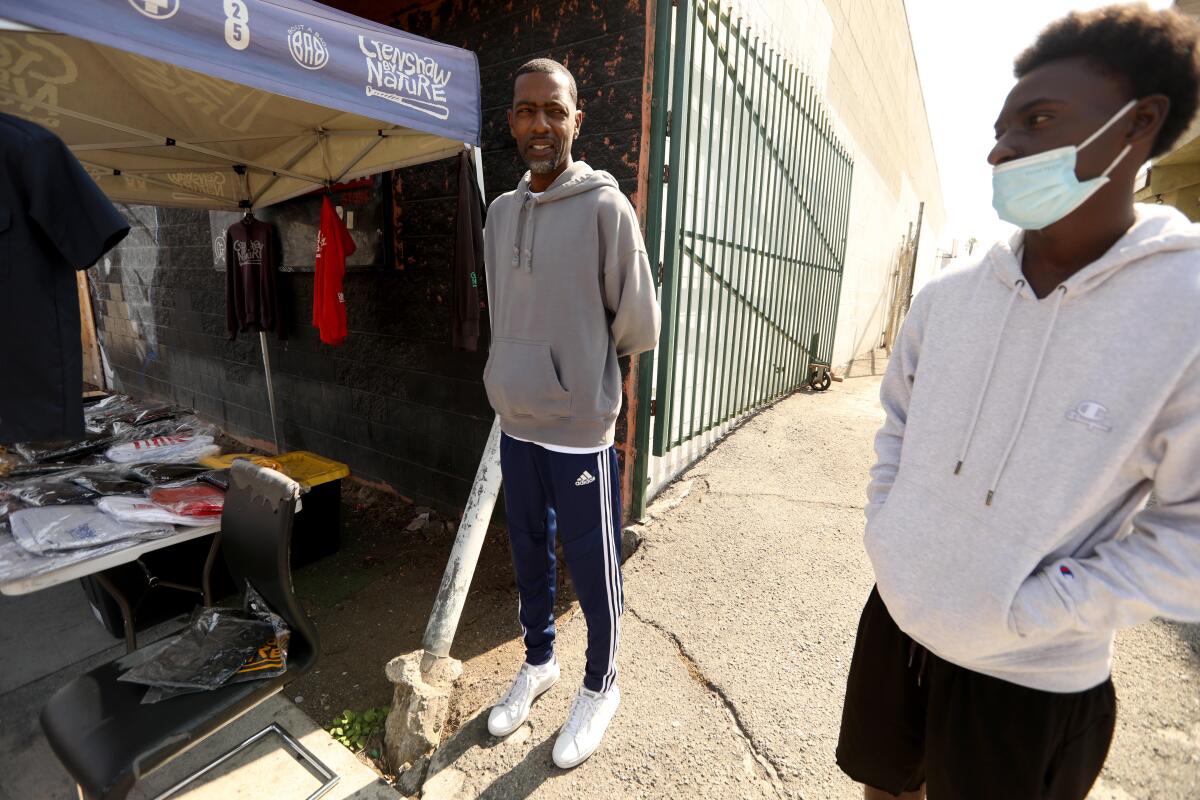
Cheryce Cryer was so outraged by what she heard from the elected officials on the leaked recording that she filed a complaint Tuesday with the federal Department of Justice’s Civil Rights Division. The 42-year-old attorney saw the news that the state’s Justice Department is investigating the redistricting process, but she worries that political ties might influence that process.
“I want the real guns to come in and look at this stuff,” she said.
“You cannot allow anti-Blackness to stay,” said Cryer, who is a downtown resident. “Racism is a cancer and it will taint and disease anything that it touches. So they cannot stay. But more than that what they expressed there was possible gerrymandering.”
“I believe that was the tip of the iceberg,” she added. “If they are speaking openly, having dinner table conversation in what they probably thought was a business meeting and there’s anti-Black rhetoric and they’re talking about redistricting along color lines, can you imagine the other type of conversations or text messages, whatever they might [have] had?”
Cryer wants to know whether Martinez, Cedillo or De León passed or vetoed any resolution or acts due to race during their time on the City Council.
“At the end of the day, there’s a lack of trust. You’re not there to represent the people. You’re there to represent your people.”
As a political science major who is already wary of high-profile politicians, Nicole Nwankwo said the recording validated her decision to pursue a career in law instead of politics, once she graduates from USC next year.
“I just feel like I have almost a sense of pessimism toward politicians,” she said. “I still want to be a realist and be like not every politician is out to just be a crony and sabotage society or whatever, but I don’t know. At the end of the day, I feel like politics is a machine and to be able to succeed in politics, you have to play into the machine, and you have to do certain things that your constituency might not always agree with, but it’s how you get you to the next point.”
She added, “That’s ultimately why morally it’s just not for me.”
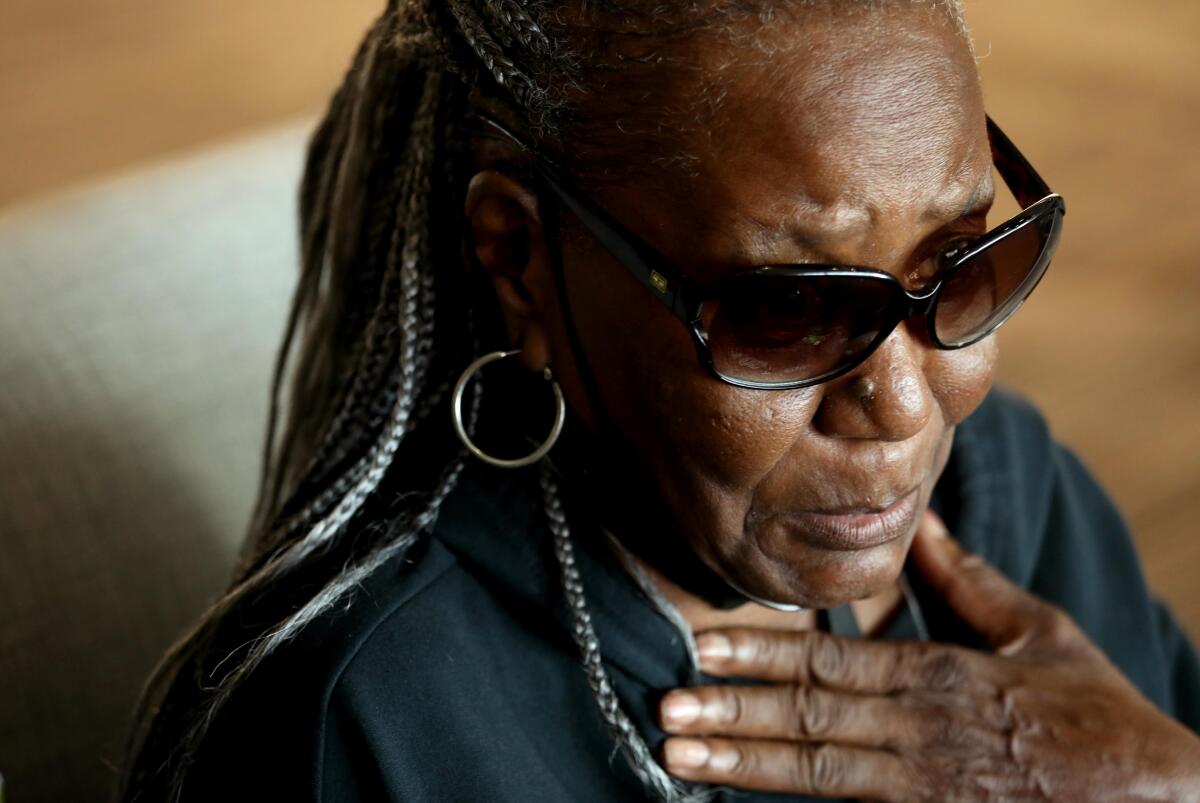
Ella Robinson grew up in a racially diverse neighborhood in Compton in the late 1940s and early 1950s, and doesn’t recall being called derogatory names. Now, listening to the leaked recording, the 76-year-old retired nurse said the politicians’ comments about Councilmember Mike Bonin’s Black son were the hardest to hear.
“It’s a sad thing for a woman to call the baby monkey,” Robinson, of West Adams, said, sitting inside Baldwin Hills Crenshaw mall. “That’s a shame. That really hurt me more than anything because when you call him a monkey, you’re calling me a monkey.”
Robinson, whose husband is Panamanian, added, “I hope they lose their jobs because they don’t work for the public anymore. They don’t deserve to be there.”
In View Park, Ray is as upset as she was when she first heard the recordings. A retired government worker, she has been having tough conversations with her children and grandchildren about how Black people have fought for representation, or the proverbial “seat at the table,” so that their concerns, interests and voices are reflected in policies and legislation. She urged them to get involved by voting and participating in government.
“Maybe my time has passed,” she said. “But darn it, their time is now, and they need to do something.”
More to Read
Sign up for Essential California
The most important California stories and recommendations in your inbox every morning.
You may occasionally receive promotional content from the Los Angeles Times.
